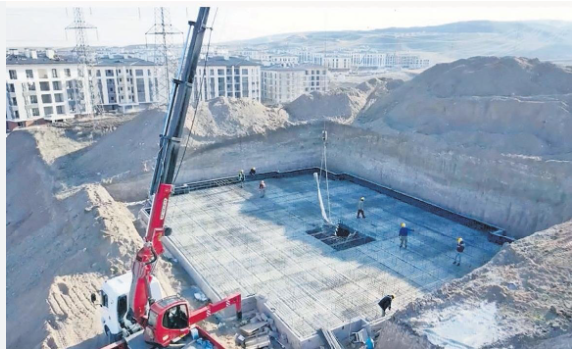Presenting the Turkish government’s budget proposal for the next year, Turkish vice president Cevdet Yilmaz recently said it would prioritise construction, revitalisation and growth in all sectors, focusing on recovery from the damage to the economy from the early-February earthquakes.
The government has allocated TL 1.03 trillion ($37 billion) in its 2024 draft budget to meet the cost of earthquake-related damage and the needs of people in the region, Yilmaz told a news conference in Ankara. There are also donations and pledges for concessional loans from World Bank EU to aid quake recovery. Erdogan may have beaten his rivals in the presidential-parliamentary election in May/June in the region largely on promises of cheap and very rapid rebuilding.
However, according to Reuters, confirmed by several Turkish sources, construction is stalled and targets are very likely to be missed. Another miserable winter in tents and container cities with little financial aid could become a forceful factor in March local elections, potentially causing AKP candidates to face severe challenges.
Reuters explains why rebuilding is moving ahead only at a snail’s pace:
“More than a dozen officials, builders and engineers told Reuters that rising construction costs and economic uncertainty have deterred companies from bidding for government reconstruction contracts, making that deadline look hard to reach, especially in the worst-hit areas.
With work underway on a fraction of the planned new buildings in the devastated city of Adiyaman, survivors fear a long wait together. They are exposed to summer and winter temperatures in the lines of containers set up as temporary housing after the Feb. 6 disaster.
By the government’s own account, 40,000 homes will be ready by the end of November, leaving three months to finish nearly 280,000 more by February.
One senior government official with direct knowledge of the reconstruction plan said the target could be missed, citing insufficient fresh funding to hold new tenders amid rising costs. Another official also cited budget constraints and said new measures were needed to speed things up.
The main reason? They both said the effort had taken a blow when fewer companies bid for the reconstruction tenders after a post-election economic policy U-turn in June sent the currency plunging.
As of Aug. 6, construction was underway on 123,000 homes, according to a Reuters review of the most recent public ministry data, covering the six months from the earthquake.
The ministry data also showed construction had only started on 7% of almost 65,000 homes the government promised would be completed in Adiyaman province within two years of the quake.
“I see no possibility of all houses being delivered in a year,” said Bayir, who is also a member Adiyaman’s Provincial Coordination Council.
Erdogan says in total 680,000 homes will be finished within two years under a government-funded scheme that will see homeowners repay the costs interest free over 20 years.
A public website showed about five project tenders per day in April, before slowing in May. The data stopped being disclosed on May 31. Reuters could not establish how many tenders have been issued since. The urbanization ministry did not respond to a question from Reuters about why the data stopped being published, always a sure sign that things are amiss.
Follow our English language YouTube videos @ REAL TURKEY: https://www.youtube.com/channel/UCKpFJB4GFiNkhmpVZQ_d9Rg
And content at Twitter: @AtillaEng
Facebook: Real Turkey Channel: https://www.facebook.com/realturkeychannel/
